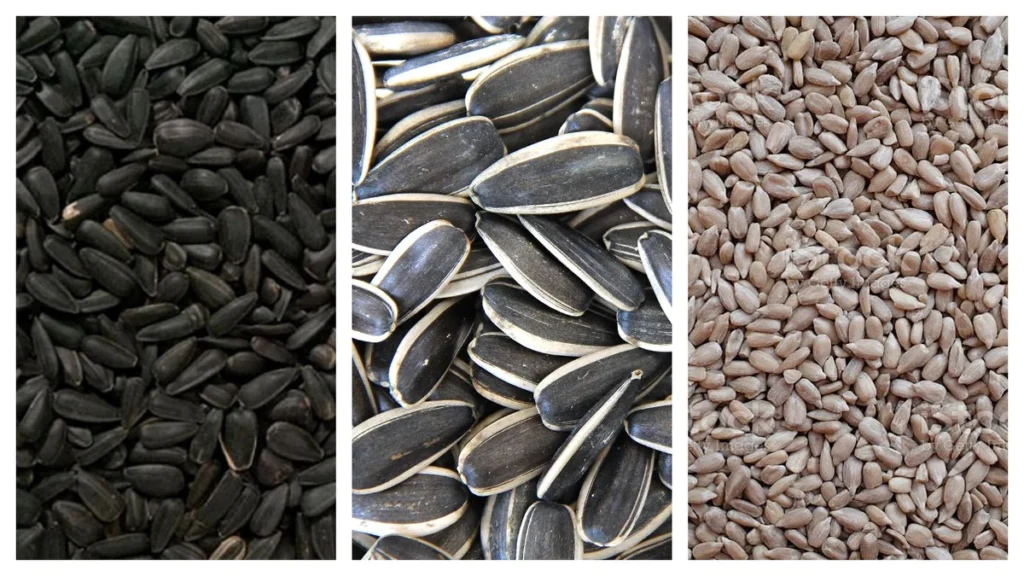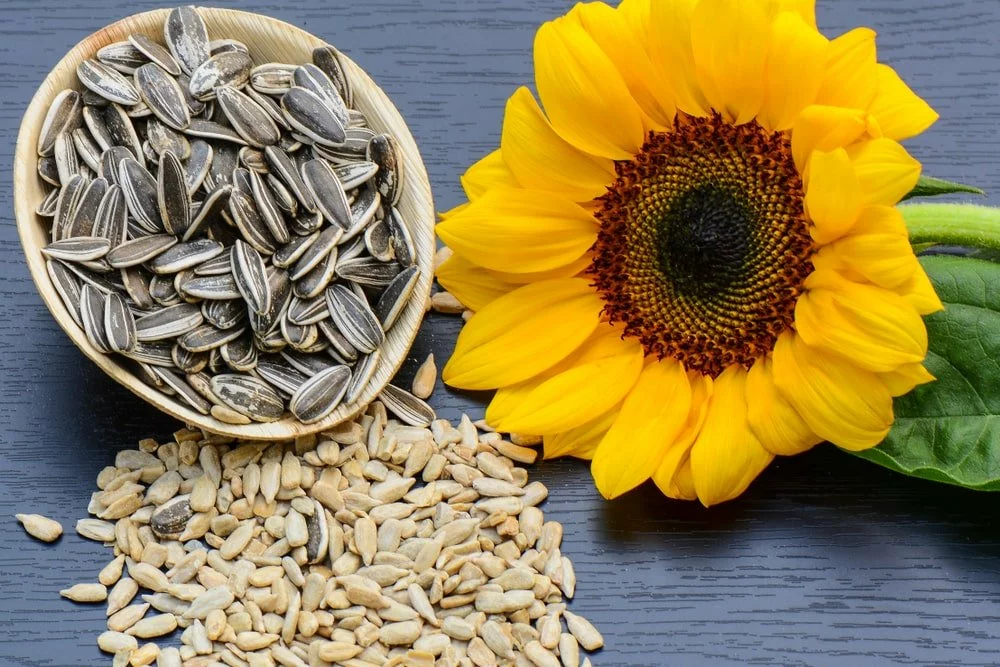Sure, I can help with that! Sunflower seeds are believed to be good for your bones. They contain important minerals like Magnesium, Phosphorus, and Calcium which can help keep your bones strong and healthy. This information comes from a study by Dr. Siddharth Gupta, who has a medical background.

Benefits Of Sunflower Seeds
Management of Diabetes
Type 2 diabetes is a lasting health issue causing too much sugar in the blood because the body doesn’t use insulin properly. This leads to problems like feeling very thirsty and hungry, needing to pee a lot, losing weight without trying, feeling tired, and having blurry vision. Sunflower seeds can help lower blood sugar levels in people with this condition.
Immunity Booster
Sunflower seeds can help boost our immunity because they contain vitamin E, zinc, and selenium. These substances have special benefits for our immune system.
Vitamin E makes our immune responses stronger and shields us from various infections. It’s like a protective shield that stops harmful molecules from damaging our healthy cells.
Zinc is like a defender for our body. It fights off inflammation, allergies, and harmful invaders that can make us sick. This keeps infections away and makes our overall immunity better.
Selenium is also a friend to our immunity. It helps calm down inflammation and makes our defense system stronger. It’s like a superhero that fights against bad molecules that can harm our body.
Reduces Cholesterol
Eating sunflower seeds with fiber helps lower bad cholesterol in the blood.
Niacin, a type of vitamin B3 found in sunflower seeds, helps lower overall cholesterol levels and decreases the chance of heart diseases.
Vitamin B5, also known as pantothenic acid in sunflower seeds, raises good HDL cholesterol and lowers the total amount of cholesterol in the blood.
Cardioprotective Effects
Sunflower seeds are full of healthy fats like oleic and linoleic acid. They have very little unhealthy saturated fats and sodium. These seeds also contain good things like magnesium, potassium, and fiber.
Eating sunflower seeds can make your blood pressure and cholesterol levels better. They also help stop irregular heartbeats. All of these things together keep your heart and blood vessels healthy and reduce the chances of heart problems.
Boosts function of Brain
Sunflower seeds have vitamin B6, which can make you feel happier and more focused. It also helps you remember things better. They release chemicals like serotonin and norepinephrine that help our body work better.
Eating sunflower seeds can also make the discomfort of premenstrual syndrome (PMS) feel better.
Reduces risk of Cancer
Beta-sitosterol, a natural compound found in sunflower seeds, can help protect against breast cancer. It stops tumor cells from growing, makes tumors smaller, and also prevents them from spreading to other parts of the body.
Eating sunflower seeds, which have powerful antioxidants, can lower the risk of cancer. These seeds can also decrease the likelihood of getting colon cancer.
A Powerhouse of Energy
Sunflower seeds have lots of thiamine (vitamin B1), which is important for turning the food we eat into energy. They also help our muscles grow. If you eat a small bunch of sunflower seeds, you can get a quick burst of energy.
Helps in Weight Loss
Sunflower seeds are packed with proteins and fiber. They keep us feeling full for a while, which means we eat less overall and take in fewer calories. This can help us lose weight.
Helps in Treatment of Anaemia
Eating sunflower seeds is good for getting more iron in our bodies. This can be helpful for people with anemia, as it boosts their iron levels.
Helps to Detox our Body
Sunflower seeds have strong antibacterial effects that efficiently eliminate bacteria and germs from cells.
They also assist in getting rid of harmful substances from our body.
Helpful During Pregnancy
Sunflower seeds contain a lot of Vitamin E, which is really good for pregnant women. This vitamin helps the baby grow well in the belly. So, eating sunflower seeds is a helpful way for pregnant women to get good nutrition for themselves and their babies.
Good for our Skin
Eating sunflower seeds can make our skin look bright and healthy. These seeds can also stop bacteria and fungi from causing infections, which helps in keeping our skin free from blemishes.
Sunflower seeds have two important acids called oleic and linoleic acids. These acids help our skin make collagen and elastin, which are important for healing cuts and wounds quickly. They also stop scars from forming.
Reduces Inflammation
Eating sunflower seeds regularly can help people with ongoing inflammation feel better. You can have them in trail mix, on cereal, or even on soup and salad. Sunflower seeds have good things like flavonoids and Vitamin E that fight inflammation. Smart people say that if you eat sunflower seeds with your meals 3 to 5 times a week, it can really help stop problems like arthritis and joint pain.
Sunflower Seeds are usually of two types-
- Sunflower Seeds that we eat
- Sunflower Seeds used to extract oil.
You can get about 2000 seeds from big sunflower heads. These seeds are good for snacking or can be added to different foods:
- Mukhwas
- Nutrition bars
- Bread
- Muffins
- Yoghurt
- Stir-fries
- Salads
You can even make sunflower butter from these seeds.
Sunflower seeds are a good source of minerals like magnesium. A recent article mentioned that these seeds might help keep your muscles strong, prevent cramps, and maintain muscle tone because they have magnesium.
Dr. Rajeev Singh, BAMS
Side effects of Sunflower Seeds:
1. Eating too many sunflower seeds might make you feel like throwing up, give you a tummy ache, or make it hard to poop.
2. If someone is allergic to sunflower seeds, they could throw up, get red, itchy skin, have trouble breathing, or see their mouth swell up.
3. Sunflower seeds have lots of calories. Eating a ton might make you gain weight. There’s a bit of cadmium in sunflower seeds. Eating too many could hurt your kidneys.
4. If you eat sunflower seeds that got infected while sprouting, you could get sick from bacteria (Salmonella).
Sure, here’s a simpler version: Sunflower seeds could help with asthma. They contain something called tocopherols, which can calm inflammation. This could be helpful for conditions like asthma and other problems with inflammation in the body.Dr. Smita barode, B.A.M.S, M.S
Daily Intake of Sunflower Seeds :
Eating more than one small cup (about 30 grams) of sunflower seeds in a day is not recommended.
Sunflower Seeds or Sunflower Oil: Which is the Healthier Choice?
Sunflower oil has a lot more vitamin E than sunflower seeds do. On the other hand, sunflower seeds have vitamin B6, iron, phosphorus, and pantothenic acid. Also, sunflower seeds cost more than sunflower oil. So, both have good and not-so-good things about them.
Ways You Can Add Sunflower Seeds to Your Daily Meals
Incorporating sunflower seeds into your meals is as simple as using any other type of seed. You can easily sprinkle them onto your salad, mix them into oatmeal, muesli, or granola, include them in trail mix, add them to energy balls for weight loss, put them in burgers, stir fry them with vegetables, or even create sunflower seed butter like peanut butter.
How to store sunflower seeds correctly without spoiling them?
You can keep sunflower seeds in a tightly sealed container in a cool and dry place like a fridge or freezer for about a year.


